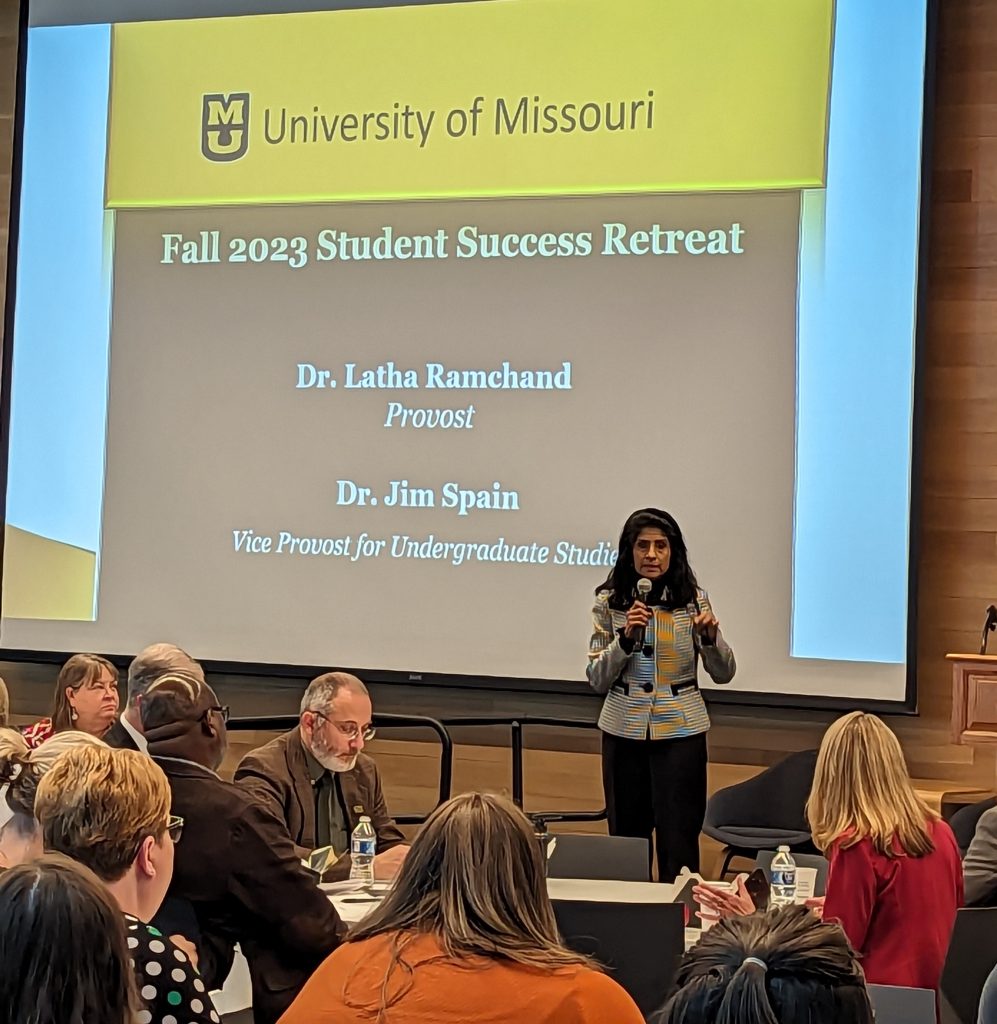Published on Oct. 26, 2023

As we all know, Mizzou has a history of rich traditions and practices. For instance, the practice of homecoming originated here. A few years ago, we added a new tradition that has now become a part of every fall semester – our Student Success Retreat. True to this tradition, we hosted our 2023 retreat on October 17th. Attendance at this event has grown stronger every year and is a clear indicator of the commitment of our faculty and staff to the students who choose Mizzou. The retreat affords us the opportunity to reflect on the activities we undertook in the past year and to make plans for the year ahead.
As Vice Provost Dr. Spain reminded us in his welcome address, we have cause for celebration. The goals we set for our four and six-year graduation rates in our previous strategic plan have been met. Now we get to turn to our goals for the next 5 years: increase student retention rates from 93% to 95%, the six-year graduation rate from 79% to 82%, and the four-year graduation rate from 63% to 66%.
The various working groups reported out on the initiatives in progress. These included the First Generation Working Group led by Rachel Orr, the Students in Distress Working Group led by Michelle Froese, the Support for Students with Disabilities Group led by Associate Dean Monnier, the Early Alert System Group led by Rachel Orr, the Process Improvements Group led by Jackie Schneller, the Campus Employment Group led by Craig Benson, the Summer Bridge Working Group led by Dr. Andre Thorn, and the Freshman Year Experience Working Group led by Dr. Spain. This was followed by recommendations from every group that need to be implemented going forward. This included ideas from our internal working groups, the National Institute for Student Success (NISS) pursuant to their review which was recently completed, and the discussions at every table at the retreat.
If one were to summarize the central theme in the recommendations, it is that we need to ensure consistency in policy so that students see us as one university rather than a group of 13 academic colleges and schools each with a different mode of support and different policies. In other words, the goal is to increase coordination in every aspect of student support from advising, communications, use of early alert systems, financial aid, mental health support, and other tools. For instance, the policy changes that the Process Improvements Group worked on that was approved by MU Faculty Council addresses inconsistencies in how academic units define academic probation and dismissal, archaic and unclear language, and practices that negatively impact our retention and graduation rates. The new policy will create an opportunity for our campus to make academic standing practices more consistent, clear, and transparent for students.
The NISS review (requires SharePoint login) recommends coordination and centralization of communications to students, standardization of advising systems and protocols, the use of early alerts to proactively support students and using this information to guide academic support, and the creation of intentional pathways for freshmen.
To ensure that our support helps the students where they are, it is imperative that we have information that allows us to identify gaps in support and address these promptly. To this end we need more information about students as they move from freshman to senior. Renee Henderson from the MU Analytics team discussed the Enrollment Lifecycle Metrics & Outcomes (ELMO) project that will compile student data from application to career outcomes. This will be released later in November and will allow us to identify times when support needs to be modified or augmented. The teams also discussed first year experiences and High Impact Practices (HIPs) to keep our students engaged and interested and made recommendations to make HIPs accessible to all students in a systematic and coordinated manner.
Other items discussed included ways for us to involve parents, the role and importance of summer breaks, mental health support and resources, the need for a freshman required course that helps students transition to college, and ways to include financial literacy into student learning.
While financial resources are often seen as a roadblock, the recommendations highlighted the need for a more strategic approach to the support we provide via centralization of some programs and coordination of support. In other words, finances can help, but we need to speak with one voice when it comes to student support and student success.